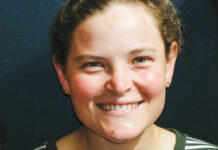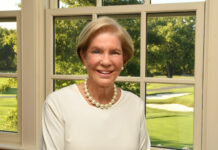Forty years later, Phil Jacobs still remembers the rush he felt when he received the news that he was hired as assistant editor for the Baltimore Jewish Times.
“I was weaned on the Jewish Times,” he said in a recent phone interview. “We got it at home, and I wanted to be part of it. It was a dream come true when I was offered the job. In fact, I couldn’t believe it, I was so excited.”
Jacobs, who turns 69 this month, grew up in a semi-detached house in the Fallstaff neighborhood of Baltimore. He went to Northwestern High School, followed by the University of Maryland College Park. His parents were “card-carrying Socialists” and the family was not affiliated with any synagogue, he said, but today, he and Lisa — his high school sweetheart and wife of 46 years — are members of Ner Tamid. They live six blocks away from his childhood home, and their two daughters live in Baltimore and Frederick with their respective families.
His first full-time position as a journalist was with The Prince George’s Journal from 1976 to 1982; he also freelanced for The Washington Post’s sports department. When he began his tenure as assistant editor at the JT in 1982, it was under editor Gary Rosenblatt and publisher Chuck Berger. “They had assembled some really fine journalists, and it wasn’t to do business as usual,” said Jacobs. “This was a serious staff being put together to cover local news and to get good, in-depth coverage.”
“I started doing stories at a time when people would say to me, ‘You’re not going to put that in the paper?’ You know, after you just spent an hour-and-a-half with them taking notes,” he said wryly. “So we had to kind of educate our public that this was what we were about: Yeah, we were holding a notebook in front of you with a pen in our hands because this was going to be an on-the-record conversation.”
‘They had to get used to it’
Before the advent of the Internet or social media, a Jewish community newspaper was the only source for such niche news. “We always felt that it was our goal to kind of be there for the Jewish community because at the time, if they wanted to get news about Israel, or Baltimore, for that matter, Jewishly they weren’t going to find it in The Baltimore Sun or elsewhere,” he said.
At the JT, Jacobs covered the AIDS epidemic, compulsive gambling, homelessness, drug use — all through the lens of its presence and impact in the Jewish community. “We started going after these issues that were, you know, the old mantra that I hate to repeat, the ‘shonda for the goyim’ thing. Well, we were doing that all over the place.”
“I think at first it was really a shock for the community. We had to get used to it, and they had to get used to it.” For instance, when Jacobs covered the story of Jewish owned-hotel that was closing because it was condemned by the county, the owner of the hotel came in to see his boss.
“I remember this 40 years later: The guy said, ‘Everything was true. I just didn’t expect to see that in MY Baltimore Jewish Times.’ That shouted to me that this was a different breed for people. But still, we continued to move forward with what we were doing.”
In 1990, after the Baltimore Jewish Times purchased the Detroit Jewish News, Jacobs moved to Detroit and had the privilege of working briefly with one of his heroes in the business: the paper’s creator and founding editor, Philip Slomovitz.
“When you come in, you can’t fill those footsteps, but you have to justice by them. I felt a tremendous responsibility in Detroit to live up to Mr. Slomovitz’s legacy,” Jacobs said.
Slomovitz also apparently had an unusual filing system.
“What he did was, if he got a letter from Golda Meir, he would stick it under the letter ‘M’ in the Encyclopedia Judaica on his bookshelf. If he got a letter from David Ben-Gurion, it would go under ‘B.’ When he died, I had to clean out his office, and I was taking every volume of the Encyclopedia Judaica and holding it upside-down, and these onion skin papers from Abba Eben, Golda Meir, David [Ben-Gurion], all ‘Dear Phil,’ you know? So I had that experience. There was even one from Hank Greenberg.” (The paper ultimately donated the letters to the Wayne State University Library, he said.)
Jacobs brought the JT’s approach to Detroit, doing exposés and covering subjects that could (and did) occasionally result in a row of rabbis outside his door on Monday morning. “I was doing my job, which meant I lived in the community, sent my kids to schools in the community,” he said. “I davened with people who I was covering” and would occasionally get cursed out by people who didn’t like him shedding light on the community’s dirty laundry.
“We got laughed at a little bit by people in the community, but we really wanted to own the Jewish community news there. We were up against people who would say, ‘We really don’t want controversial news. We want to be able to sit down with our Detroit Jewish News or our Baltimore Jewish Times on Friday night and relax with it.’”
‘It was a hand-wringing story’
Jacobs gave an understated nod to his award-winning reporting uncovering years of sexual molestation within Baltimore’s Orthodox community. Sometimes, however, even the most seemingly mundane community goings-on ended up the stuff of controversy as well.
He offered as an example the public debate over keeping the Owings Mills JCC open on Shabbat, which occurred right when he returned to Baltimore and the JT in 1997. “It was controversial because the Orthodox community here in Baltimore is so big and so powerful, but the issue was that the Owings Mills JCC couldn’t compete with Gold’s Gym and all these other fitness places out in Owings Mills If they weren’t open on Saturday.”
For the community, “it was a hand-wringing story,” he said. The JT even had to take an editorial stance on the matter.
When the Internet came into play for journalism in the 2000s, people could get their Jewish news almost anywhere. Papers like the JT faced (and continue to face) the challenge of how to stay unique, he pointed out.
“At one time, I don’t want to say they monopolized, but at one time they were the source. We would get calls all the time from other news organizations asking us what we thought of military action in Israel or Iran or Egypt or something going on in the Jewish community in Baltimore, so we were prepared for that. But then, you know, they didn’t call us anymore.”
Now in his eighth year of teaching Jewish History at Beth Tfiloh Dahan Community School in Pikesville, Jacobs says he is having “the career time of his life.”

Jacobs had always flirted with the idea, he said: In Detroit, a friend invited him to teach a current events class once a week at a local temple, or he would answer the summons for a substitute teacher. When he came back to Baltimore, he taught history and current events at different schools a few times a week; when he stopped doing journalism full time and was freelancing, Dr. Tzipi Schorr at Beth Tfiloh reached out to see if he would teach Jewish history.
“I never thought I’d be teaching full time at a Jewish high school, but it’s been a total reinvention, and the school has been wonderful and the kids are wonderful.”
Jacobs is also in his second year of teaching a class called “Modern Problems.” He modeled it on a course from his own high school years where the teacher would bring in some of the most controversial issues of the day. “Back in 1970, those issues included racism and antisemitism — the same stuff we’re talking about today, just a different way of packaging it.”
“I love it,” he said effusively. “The kids are so ready to speak and ready to learn, so it’s been a real amazing experience.”
Given its relevance today— and Jacobs’s background— it’s not surprising that media literacy and media bias are among the subject matter. Embedded as he is among the upcoming generation of the Jewish community, he observes trends in their media consumption worth noting.
“I see a lot of narrowcasting that goes on, so the kids are going to get their information from one place. They’re not going to hear what the other side has to say. Not everybody, but I find that a lot; instead of kind of a broadcast, they-re getting a narrative.” He gives his students “doses” of news from different sources, both in American and Israeli media, exposing them to other views and giving them practice discussing opposing views “in a respectable way.”
Another concern for Jacobs was where kids are getting their news. Not only are print newspapers not on their radar, but websites and social-media platforms that used to be the new frontier of news are in the rearview mirror from their perspective. “They’re getting push alerts [on their phones] and going on TikTok,” he said. “I do teach adult education, and the adults are still going to sources that we’re familiar with, even newspapers, but the younger [people], not so much.”
His advice to Jewish media outlets: “If you’re not on where they’re at, they’re not going to look for you.” Instagram, TikTok, Twitter and podcasts are “everything,” he said.
Additionally, outlets that want a future need to have a digital editor: not just someone who puts stories online, but who is also actively immersing themselves in the social, cultural and intellectual discourse on these platforms, and hearing points of view they don’t necessarily agree with but need to know.
“Or we’ll lose them,” he stated plainly. “We’re just going to lose them.”







